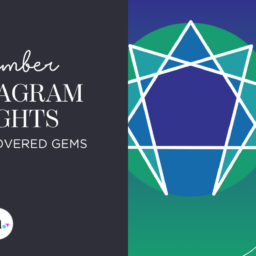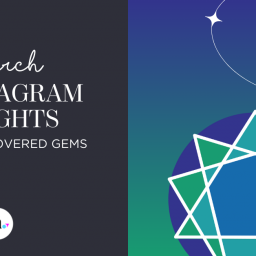
 Welcome to Indy Maven’s Enneagram column coming by way of Jenn Lisak Golding of Uncovered Gems. Check out her website for even more info from the world of Enneagram, or to book a private session.
Welcome to Indy Maven’s Enneagram column coming by way of Jenn Lisak Golding of Uncovered Gems. Check out her website for even more info from the world of Enneagram, or to book a private session.
Over the past few years, you may have heard about the Enneagram in passing as it continues to garner popularity. If you’re anything like me, you might have been immediately intrigued by it, wanting to know more about how it can help on your personal growth journey. However, many have chalked it up to yet another personality assessment that will lose its appeal over time.
Personality assessments can be powerful tools for understanding ourselves and others. I’m here to share why the Enneagram has been one of the most impactful tools I’ve ever seen in action.
What is the Enneagram?
The Enneagram is a system that helps type personalities. Each type has a core motivation and fear, which starts to develop in childhood. Your type influences how you experience and interact in the world, from relationships to careers to how you handle stress and conflict.
While many believe it’s a fairly new emotional intelligence and personality assessment tool, the Enneagram is actually over 4,000 years old with ties to spiritual institutions and philosophers. Some even call it the “astrology of religion,” and it was developed to help build self-awareness and to improve relationships. At the heart of the Enneagram is the power to better understand yourself and how this self-wisdom can help you grow both personally and professionally—in other words, tapping into your highest self.
I was personally introduced to the Enneagram in a business setting as a way to help communicate better as a leader and with my team. I see practical applications for the Enneagram every day at home, at work and in relationships. I’m not a religious person, but I am a deeply spiritual person who cares greatly about understanding others and myself. The Enneagram has honestly been one of the best things for both my personal and professional growth journeys, and it can be for you, too.
There is so much to say about each Enneagram type, but for now, let’s stick with the basics: the type name, core motivation, and a short description.
Brief Introduction to the Enneagram Types
There is so much to say about each Enneagram type, but for now, let’s stick with the basics: the type name, core motivation and a short description.

Heart Center Types
Type 2: The Advisor/Helper
Core Motivation: To be wanted, loved and needed
Short Description: Type 2s are the natural givers of the Enneagram. They are generous, warm and often complimentary. They tend to be confidants and can easily read the emotions of others. They are intuitive to the needs of others, but often neglect their own needs. It’s important for this type to learn to take care of themselves and learn that they are deserving of the love and care they give others.
Type 3: The Achiever/Performer
Core Motivation: To be successful, admired and competent
Short Description: Type 3s are ambitious and adaptive, often called the chameleons of the Enneagram, since they can adapt quickly in many environments. They care deeply about being perceived as successful and capable by others. 3s are hardworking and strategic, and they have a lingering sense of sadness because they think that they haven’t accomplished enough. Relishing their accomplishments is an important lesson for this type.
Type 4: The Individualist/Creative
Core Motivation: To be unique and deeply significant
Short Description: Type 4s care deeply about being significant, unique and having value. They are comfortable living with a wide range of emotions, from happiness to melancholy. They are guilty of comparing themselves to others, feeling that something is missing, defective or incomplete about them. They have deep imaginations and bring unique gifts, as well as authenticity, to the world around them.
Head Center Types
Type 5: The Thinker/Observer
Core Motivation: To be competent, resourced, and useful
Short Description: Type 5s are well-researched, curious and thoughtful, longing always to learn more. They tend to take time to observe before engaging by gathering information, knowledge, data and facts; they need to feel prepared. They also tend to value privacy and share very little about themselves. Fives care deeply about being useful in the world as a resource, while also disconnecting themselves from emotion.
Type 6: The Guardian/Loyalist
Core Motivation: To be safe, secure and supported
Short Description: Type 6s have a high sense of risk awareness, showing up as reliable, responsible and vigilant. It’s important for 6s to scan for potential risks so they can plan and avoid hazardous or dangerous situations. They are guilty of analysis paralysis, including doubting their own decisions. Anxiety can be common for this type. They commonly give support to others, are team players, and are loyal.
Type 7: The Optimist/Enthusiast
Core Motivation: To be positive and optimistic to avoid pain
Short Description: Type 7s are incredibly energetic, versatile and playful. They love to bring fun and positivity to an environment and are commonly known as innovators, having a wealth of new ideas. They can overthink, which leads to indecision. They are typically great storytellers and love starting new projects and endeavors. Learning to live and learn from pain is an important growth point for this type.
Body Center Types
Type 8: The Challenger/Protector
Core Motivation: To be strong and avoid weakness
Short Description: Type 8s are confident, decisive, protective and assertive. Being strong is at the core of a Type 8, not being afraid to challenge the status quo or an unjust situation. Truth is incredibly important to them, and they prefer a direct style of interaction. They will fight for the “little guy” and are comfortable with anger and expressing it. Vulnerability can be hard for this type.
Type 9: The Mediator/Peacemaker
Core Motivation: To be comfortable and at peace
Short Description: Type 9s are accepting, agreeable and trusting. They will avoid anything that could create internal (or even external) disruption for the sake of keeping the peace. They can try to please everyone at the sake of their own needs. They love routine and comfortable environments. It’s important for this type to find their voice and use it.
Type 1: The Reformer/Perfectionist
Core Motivation: To be good and avoid being at fault
Short Description: Type 1s care deeply about ethics and principles, guided by a strong sense of right and wrong. They tend to have a strong inner voice that can be a coach or critical, pointing out areas of growth and improvement. Receiving negative feedback can be hard for this type. They are skilled at creating order from chaos, and they are driven by the belief that anyone and everyone can improve.
There are a variety of free and paid assessments available to identify your type, but these tests are only about 60% accurate. It’s best to identify your type with a certified Enneagram practitioner or coach (I can help!) who can conduct a typing interview to narrow down and solidify your type.
How is It Different?
Many times, people ask what the difference is between the Enneagram and other personality assessments. First and foremost, the Enneagram has stood the test of time and has been leveraged for thousands of years. It’s not a new tool, although its popularity has increased as of late.
The primary differentiator of the Enneagram, however, is the fact that it focuses on core motivations instead of behaviors. It focuses on the why, not just the what. Two individuals could have the same behavior, but their motivations for that behavior can be drastically different. By understanding core motivations, we can better understand the why behind our actions and how we can adapt to grow.
Many personality assessments tend to look at behaviors because they are measurable. However, motivations are not exactly measurable, which means that the Enneagram is not scientific. That doesn’t detract from the Enneagram’s value, where millions of people have resonated with the findings. One of my personal coaches, Rachel Pritz, explains this really well:
“We created these behaviors in childhood to protect ourselves from pain and suffering, so we rarely even think about them unless we create the emotional and mental space to observe ourselves and the why behind the behaviors. This is exactly why the Enneagram isn’t scientific. There is no way to measure our internal environment other than putting in the work personally. Many personality typing systems focus in on behaviors because they are measurable. But the Enneagram is helping you understand the why behind your behaviors.” —Rachel Pritz, Certified Life Coach and Certified Enneagram Coach.
Let’s Be Clear: You Are More Than a Number
One of the most common complaints I hear about the Enneagram is that it boxes people in. It’s important to be clear on something: you are more than a number. People are multi-faceted, and your number does not define you. However, by knowing our number, we can identify areas of growth that will help us. It can also help us understand our differences and natural defaults.
I’m passionate about this tool because I love helping others tap into the highest version of themselves, and I’ve seen its power firsthand, both personally and professionally. Stay tuned for monthly insights about the Enneagram.
Jenn Lisak Golding is a certified Enneagram coach through The Art of Growth and the face behind Uncovered Gems. She is also the founder and owner of the sister brand Sapphire Strategy, a measured marketing agency. As a long-time fan of emotional intelligence, Jenn is passionate about helping individuals, teams, and leaders grow personally and professionally on their growth journeys.
All of our content—including this article—is completely free. However, we’d love if you would please consider supporting our journalism with an Indy Maven membership.
















